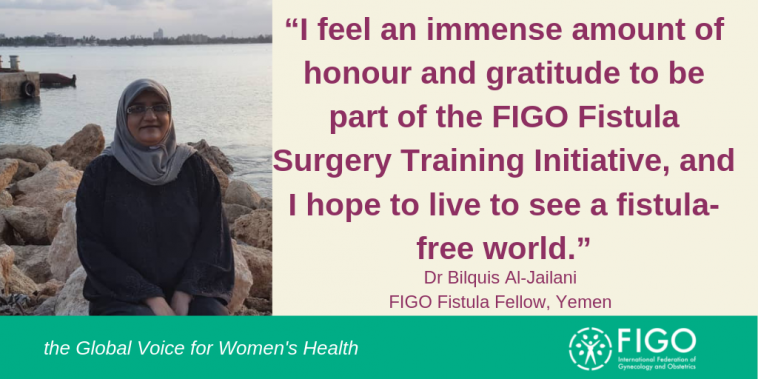In Yemen, Ending Fistula under Armed Conflict

Obstetric fistula is a devastating childbirth injury, and a neglected public health and human rights issue.
2 million women in low-resource settings have an obstetric fistula, and up to 100,000 develop one every year. Leaking urine and / or faeces and living in despair on the margins of their own life, only 1 in 50 will ever receive treatment.
FIGO Fellows, trainee fistula surgeons from some of the world’s most underserved regions, are committed to closing this gap in care.
Dr Bilquis Al-Jailani, who works at Al-Thawra Hospital in Yemen, shares her story.
There is a patient I will never forget, for the rest of my career. Her neighbourhood was being raided by air missiles when she went into labour, so she was unable to leave her house.
She tried giving birth at home, but the baby was obstructed. She stayed in labour for more than 24 hours before being transported through the dangerous roads to the nearest health facility. The baby perished.
A few days later, she came to Al-Thawra Hospital for help. When she came, she was scared and miserable. After her operation, which was a success, the light returned to her eyes.
I feel an immense amount of honour and gratitude to be part of the FIGO Fistula Surgery Training Initiative. Obstetric fistula has terrible consequences for women. They suffer quietly, even though their condition can be fixed.
Altair* was a patient who suffered from an obstetric fistula for years, and told me how her family fell apart. Divorced by her husband. Ashamed and isolated. She would take showers multiple times per day. She would use perfumes to cover her smell. She was too embarrassed to attend social gatherings and interact with other people. She began to feel lonely and depressed. She felt unloved by her family.
I love helping women with fistula and seeing how their lives have dramatically improved after their operations. They come back with regained dignity and confidence, and I believe it is our duty as health professionals to help these women recover and live dignified and prosperous lives.
We were able to repair Altair’s fistula, and after so much suffering, she was finally at ease. She felt that she regained her humanity and that she could once again enter society, with a passion to encourage other fistula patients to seek medical care and spread awareness about this condition, so no women has to endure what she had.
Maternal mortality is an important issue, but maternal morbidity is also significant. Maternal morbidities, such as fistula, push women to the margins of society. We must give more attention to these issues. We must ensure not only that our patients live, but that they live well.
There are an increasing number of programmes likes FIGO’s, that are working toward bringing awareness about fistula and helping women with this condition. Thus, I do believe that the end of fistula is upon us, and I hope to live to see a fistula-free world.
Maternal mortality is addressed in the 2030 Sustainable Development Agenda but maternal morbidity is not, even though it is a greater burden. Saving a woman from death and leaving her incontinent, isolated and devastated is not life-saving: it is a human rights violation.